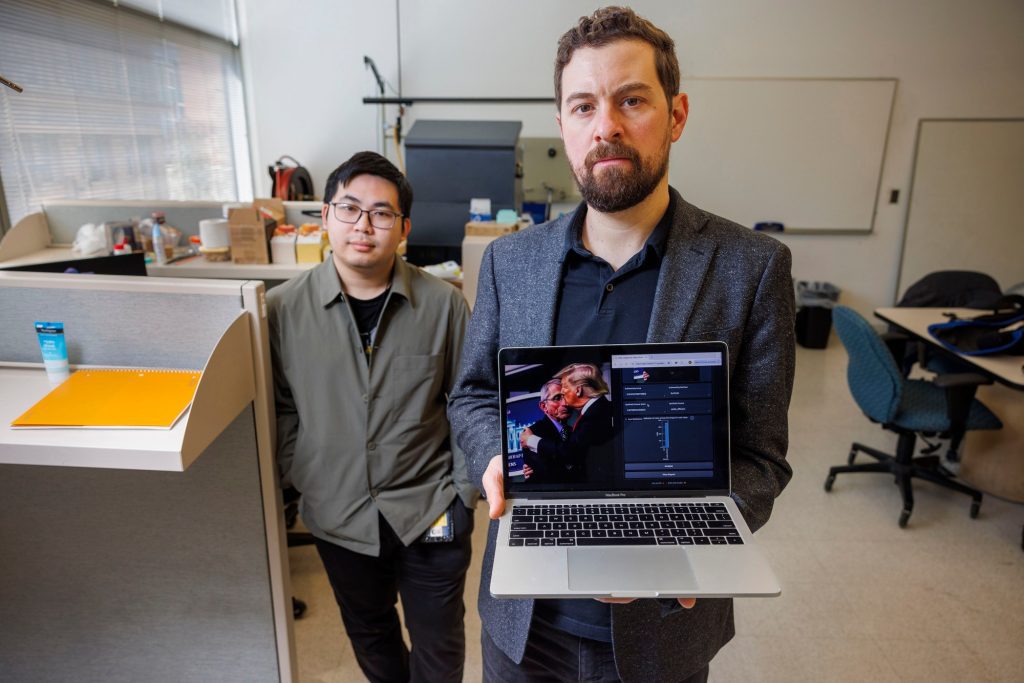Alfred Lubrano | (TNS) The Philadelphia Inquirer
Artificial intelligence is advancing rapidly during the presidential campaign, capable of producing countless fake images that are difficult to spot and easy to believe.
Experts are warning that by November, voters may have seen fake photos and videos of candidates acting out various scenarios, making it nearly impossible to distinguish reality from falsehood.
Matthew Stamm, an electrical and computer engineering professor at Drexel University, who heads a team that detects false or altered political images, believes that this is the first AI-era presidential campaign and things are likely to worsen.
Last year, Stamm’s group exposed a misleading political ad for then-presidential candidate Florida Republican Gov. Ron DeSantis on Twitter, showing former President Donald Trump embracing and kissing Anthony Fauci, which was a significant moment in U.S. politics.
Stamm, director of his school’s Multimedia and Information Security Lab, described this incident as a groundbreaking occurrence where AI-created media was used in a deceptive manner in a major presidential candidate's ad for the first time.
Stamm mentioned the potential of AI to generate voting misinformation, indicating the possibility of chaotic situations.
Election experts express concern about the potential of AI to disrupt the election by producing false evidence of candidate misconduct, fake videos of election workers tampering with ballots, deceptive emails, and misleading texts to election officials.
Pennsylvania Secretary of State Al Schmidt is leading a newly formed Election Threats Task Force to combat voting misinformation, acknowledging the greater challenge of AI if it's used to deceive voters or harm candidates compared to more primitive methods like tweets and Facebook posts.
AI presents a greater challenge if it's used to deceive voters or harm candidates, according to Pennsylvania Secretary of State Al Schmidt.
Sham Biden call
Similar to the internet, AI has the potential to both advance and hinder society.
While bad actors have been able to create deceptive content for a long time, manipulating text and imagery to shame or slander a political opponent used to require expert skills and effort, but now, even high school students can create deepfakes easily.
Deepfakes are manipulated media where a person's likeness is replaced with another's, or a person appears to be doing or saying something they didn’t.
Before the January New Hampshire primary, an AI-generated robocall imitated President Joe Biden’s voice, urging voters not to participate and to save their votes for the November election.
The Campaign Legal Center in Washington, D.C., a nonpartisan government watchdog group, mentioned that ordinary voters might have thought Biden created the message and lost their right to vote because of it.
CLC executive director Adav Noti stated that this is the first time AI has had a widespread impact throughout the entire voting process. He added that AI makes it easier to use new tools to undermine our democracy more effectively.
Malicious intent
According to the Cybersecurity & Infrastructure Security Agency, part of the U.S. Department of Homeland Security, AI enables people with malicious intent to operate quickly and skillfully at a low cost.
In June 2018, Doermann's University of Buffalo colleague Siwei Lyu presented a paper showing how AI-generated deepfake videos could be identified because the subjects did not blink their eyes, as their faces were taken from still photos.
Doermann mentioned that within three weeks, fraudsters using AI stopped making deepfakes based on photos and began using videos in which people blinked naturally. He added that every time a solution is published for detecting AI, someone quickly finds a way around it.
Political communications expert Kathleen Hall Jamieson, director of the University of Pennsylvania’s Annenberg Public Policy Center, stated that AI has significantly improved over the past six years, with capacities that continue to grow daily. She emphasized that current statements about AI will likely change in just two weeks, indicating that deepfakes will become increasingly difficult to detect.
“We should be suspicious of everything we see.”
‘Democracy can wither’
According to Matt Jordan, director of the Pennsylvania State University News Literacy Initiative, misinformation, including some from Russia, has spread widely. He added that the ability to share reality is crucial for democracy, and misinformation undermines it. He warned that in such an atmosphere, “democracy can wither.”
Democracy, Jordan said, “depends on a capacity to share reality,” which misinformation shatters. In such an atmosphere, he warned, “democracy can wither.”
Politicians aren’t the only ones at risk in that atmosphere.
Security specialists suggest that election workers keep personal social media accounts private to limit the access of pernicious individuals armed with AI to their images and voices. To prevent online intimidation on Election Day, experts also recommend election workers use multistep log-ins, ever-changing pass phrases, and fingerprint scanning.
“In 2020, we encountered a lot of ugliness related to threats, and have had to scramble to make sure our people feel safe,” said Schmidt, Pennsylvania’s top election official.
Cristina Bicchieri, Penn professor of philosophy and psychology, mentioned that AI-generated misinformation worsens the existing political divide in America.
She stated, “When we see something in social media that aligns with our point of view, even if it’s fake, we tend to want to believe it.”
To combat fabrications, Stamm of Drexel recommended that savvy consumers refrain from reposting emotionally charged content on social media until verifying its accuracy.
But that is a big thing to request.
He admitted that it is more difficult to solve human overreaction to a false report than any anti-AI work he does in his lab.
And that is another reason why we are in unknown territory.
(c)2024 The Philadelphia Inquirer. Visit The Philadelphia Inquirer at www.inquirer.com. Distributed by
_____
Tribune Content Agency, LLC. Experts caution that by November, voters will have seen fake photos and videos of candidates acting out various scenarios, causing reality to be damaged and the truth to be almost impossible to determine.









